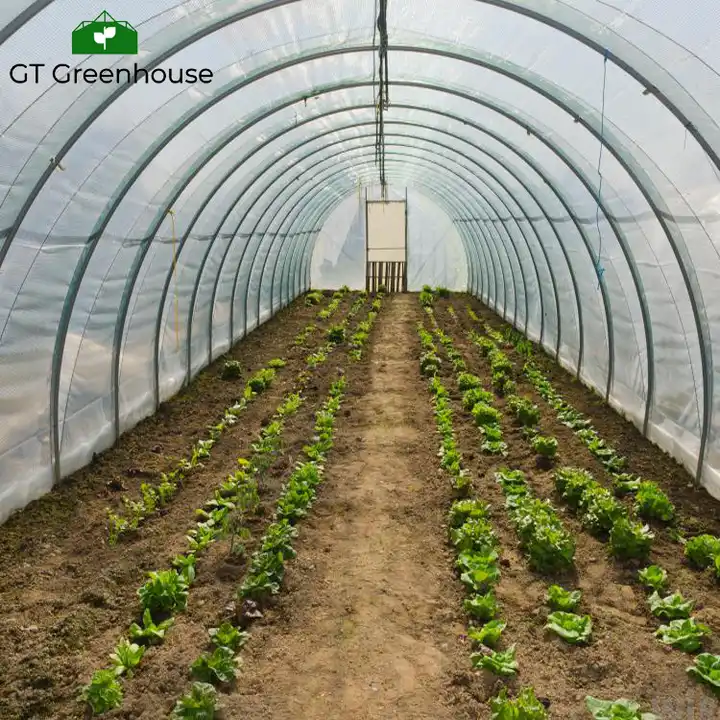Tunnel greenhouses, also known as hoop houses or high tunnels, are versatile structures widely used in modern agriculture to extend growing seasons, protect crops, and optimize cultivation practices. These cost-effective and flexible structures offer numerous advantages for growers across different regions and climates. In this article, we will explore the various applications and benefits of tunnel greenhouses. By understanding their versatility, agricultural professionals and enthusiasts can leverage these structures to enhance crop production, protect plants from environmental stresses, and achieve year-round farming success.
Season Extension and Crop Protection
- Extending Growing Seasons:Tunnel greenhouses excel at extending growing seasons by creating a controlled microclimate. The structure’s plastic cover efficiently traps heat from sunlight, creating a warmer environment that protects crops from frost and cold temperatures. This enables growers to start planting earlier in the spring and continue cultivation into the fall or even winter, depending on the region.
- Crop Protection:Tunnel greenhouses provide effective protection against adverse weather conditions, pests, and diseases. The plastic cover acts as a barrier, shielding crops from heavy rain, hail, wind, and excessive UV radiation. Additionally, the enclosed structure helps prevent infestations by insects, birds, and larger animals, reducing the need for chemical interventions.
Crop Diversification and Specialty Crops
- Crop Diversification:Tunnel greenhouses offer opportunities for crop diversification, allowing growers to expand their product range and meet market demands. The controlled environment within the tunnel enables the cultivation of crops that are not typically suited to the local climate or growing season. This opens doors for the production of specialty crops, exotic fruits, and vegetables that fetch higher prices in niche markets.
- Protected Cultivation:Certain crops, such as delicate herbs, salad greens, and flowers, require protection from harsh weather conditions, excessive sunlight, or wind damage. Tunnel greenhouses provide the ideal environment for these crops, ensuring optimal growth and quality. Furthermore, the controlled environment allows for precise management of factors like temperature, humidity, and irrigation, optimizing crop performance.
Organic Farming and Sustainable Practices
- Organic Farming:Tunnel greenhouses support organic farming practices by reducing reliance on synthetic chemicals. The enclosed structure acts as a physical barrier against pests, minimizing the need for pesticides. This enables growers to adopt organic pest control methods, such as beneficial insects or organic-approved sprays, while maintaining high-quality produce.
- Water Conservation:Tunnel greenhouses contribute to water conservation efforts by reducing evaporation and optimizing irrigation practices. The plastic cover helps retain moisture within the structure, reducing water loss due to evaporation. Additionally, growers can implement efficient drip irrigation systems or rainwater harvesting techniques to minimize water usage and maximize resource efficiency.
- Environmental Sustainability:Tunnel greenhouses promote sustainability by reducing the carbon footprint associated with long-distance transportation of produce. By cultivating crops locally and extending growing seasons, growers can provide fresh and locally sourced food to their communities. This reduces the energy consumption and emissions associated with transportation, contributing to a more sustainable food system.
Small-scale Farming and Community Gardens
- Small-scale Farming:Tunnel greenhouses are particularly advantageous for small-scale farmers and urban growers. These structures are cost-effective compared to larger-scale greenhouse systems, making them more accessible to individuals with limited resources. Small-scale farmers can utilize tunnel greenhouses to start or expand their operations, enabling them to produce food for local markets and contribute to food security.
- Community Gardens and Educational Programs:Tunnel greenhouses are valuable assets in community gardens and educational programs. These structures make it possible to teach sustainable farming practices, promote food self-sufficiency, and engage community members in hands-on learning experiences. Tunnel greenhouses provide a controlled environment for teaching gardening techniques and crop production, empowering individuals and fostering a sense of community.
Tunnel greenhouses offer a multitude of applications and advantages in modern agriculture. From extending growing seasons and protecting crops to facilitating crop diversification and promoting sustainable practices, these versatile structures have become indispensable tools for growers across different regions and farming scales. By harnessing the benefits of tunnel greenhouses, farmers can optimize crop production, increase food security,tunnel greenhouse and contribute to a more sustainable and resilient agricultural industry. As the demand for locally sourced and specialty crops continues to rise, tunnel greenhouses provide an accessible and cost-effective solution for farmers, small-scale growers, and community-driven initiatives alike.

